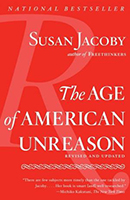24 September 2016
The Age of American Unreason, by Susan Jacoby
Posted by Callan Bentley
 I probably should have read this book eight years ago when it was first published, but somehow I missed it then. I recently heard the author, Susan Jacoby, on the podcast Point of Inquiry, and was impressed at the cannon of works she had produced. The current U.S. election cycle has spurred me to think more than I usually do about what constitutes rational thought, and why it seems to be in such short supply these days in America. So I listened to the audiobook version of The Age of American Unreason last week. It isn’t merely a polemic about modern sloppy thinking, but takes an historical approach, looking at the various factors that have influenced American intellectuals over the course of the nation’s history. She weaves in her own experience growing up reading voraciously in a “middlebrow” home in the upper Midwest, and her time as a journalist and in the Soviet Union. There are some elegantly made points about the value of reading widely and how that habit has diminished shockingly in the general population over the past several decades as our time has become consumed with other forms of entertainment and insight: television, the internet, digital music, video games. One thing that I thought was really insightful is her elucidation of the cultural baggage associated with being an intellectual. She deconstructs John Kerry’s campaign for president, and how he stooped to Bush’s anti-intellectual “folksy” level with dumb stunts like the duck hunting farce and an intentional impoverishment of his language (though never going so far as the nuke-yuh-ler option). However, at times Jacoby’s perspective struck me as curmudgeonly. The logical fallacies she commits when griping about how much time kids these days play video games weaken the stronger parts of her book. The other criticism I would offer is that the book is dated, and feels dated. It was written during the waning year of the last Bush administration, a political era known for its disdain for liberal intellectuals and the “reality-based” community (no joke). There was (justifiably) a lot of anti-Bush vitriol in the reality-based community in those days, but now with the specter of a Trump dictatorship looming, all that feels a little bit quaint and fretful. This isn’t a timeless book. That said, if you want a bit of background about why on Earth Donald Trump should be anything close to as popular as he apparently is, this would be a good place to start. (You also might consider It Can’t Happen Here, by Sinclair Lewis.)
I probably should have read this book eight years ago when it was first published, but somehow I missed it then. I recently heard the author, Susan Jacoby, on the podcast Point of Inquiry, and was impressed at the cannon of works she had produced. The current U.S. election cycle has spurred me to think more than I usually do about what constitutes rational thought, and why it seems to be in such short supply these days in America. So I listened to the audiobook version of The Age of American Unreason last week. It isn’t merely a polemic about modern sloppy thinking, but takes an historical approach, looking at the various factors that have influenced American intellectuals over the course of the nation’s history. She weaves in her own experience growing up reading voraciously in a “middlebrow” home in the upper Midwest, and her time as a journalist and in the Soviet Union. There are some elegantly made points about the value of reading widely and how that habit has diminished shockingly in the general population over the past several decades as our time has become consumed with other forms of entertainment and insight: television, the internet, digital music, video games. One thing that I thought was really insightful is her elucidation of the cultural baggage associated with being an intellectual. She deconstructs John Kerry’s campaign for president, and how he stooped to Bush’s anti-intellectual “folksy” level with dumb stunts like the duck hunting farce and an intentional impoverishment of his language (though never going so far as the nuke-yuh-ler option). However, at times Jacoby’s perspective struck me as curmudgeonly. The logical fallacies she commits when griping about how much time kids these days play video games weaken the stronger parts of her book. The other criticism I would offer is that the book is dated, and feels dated. It was written during the waning year of the last Bush administration, a political era known for its disdain for liberal intellectuals and the “reality-based” community (no joke). There was (justifiably) a lot of anti-Bush vitriol in the reality-based community in those days, but now with the specter of a Trump dictatorship looming, all that feels a little bit quaint and fretful. This isn’t a timeless book. That said, if you want a bit of background about why on Earth Donald Trump should be anything close to as popular as he apparently is, this would be a good place to start. (You also might consider It Can’t Happen Here, by Sinclair Lewis.)


 Callan Bentley is Associate Professor of Geology at Piedmont Virginia Community College in Charlottesville, Virginia. He is a Fellow of the Geological Society of America. For his work on this blog, the National Association of Geoscience Teachers recognized him with the James Shea Award. He has also won the Outstanding Faculty Award from the State Council on Higher Education in Virginia, and the Biggs Award for Excellence in Geoscience Teaching from the Geoscience Education Division of the Geological Society of America. In previous years, Callan served as a contributing editor at EARTH magazine, President of the Geological Society of Washington and President the Geo2YC division of NAGT.
Callan Bentley is Associate Professor of Geology at Piedmont Virginia Community College in Charlottesville, Virginia. He is a Fellow of the Geological Society of America. For his work on this blog, the National Association of Geoscience Teachers recognized him with the James Shea Award. He has also won the Outstanding Faculty Award from the State Council on Higher Education in Virginia, and the Biggs Award for Excellence in Geoscience Teaching from the Geoscience Education Division of the Geological Society of America. In previous years, Callan served as a contributing editor at EARTH magazine, President of the Geological Society of Washington and President the Geo2YC division of NAGT.